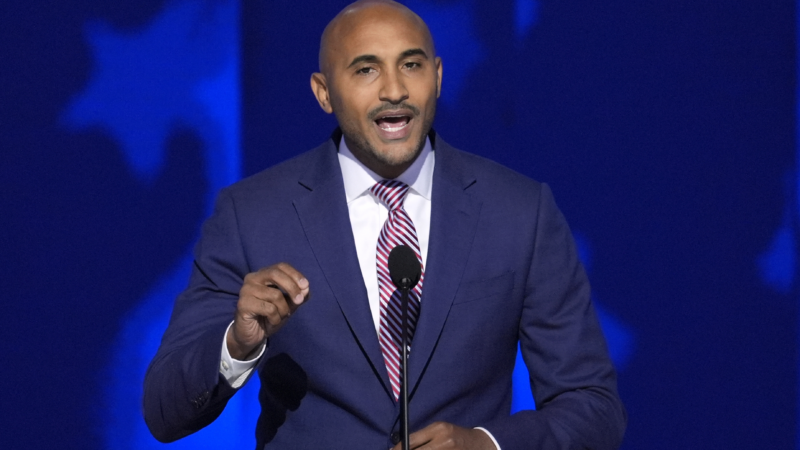Court rules Alabama redistricting intentionally discriminates against Black voters
A panel of three federal judges says the Alabama Legislature intentionally drew its congressional district map to dilute Black voting strength, which is unconstitutional and violates the Voting Rights Act.
The judges also said the state can’t use the map in future elections.
The 571-page ruling issued Thursday comes in a lawsuit, Allen v. Milligan, that made it to the U.S. Supreme Court. The court agreed then that Alabama’s 2021 congressional map discriminated against Black voters, in a state where African-Americans make up about a quarter of the population.
Loading…
When the Republican-controlled state legislature failed to create a new district in 2023 that would give Black voters an opportunity to elect a candidate of their choice, a federal court drew one. It resulted in the 2024 election of a Black Democrat — Rep. Shomari Figures. So Alabama now has two Black members of Congress, out of its seven seats in the U.S. House.
But the litigation continued, and federal judges Stanley Marcus, Anna Manasco and Terry Moorer, held a trial in February.
In finding for the Black voters who sued, they wrote, “try as we might, we cannot understand the 2023 Plan as anything other than an intentional effort to dilute Black Alabamians’ voting strength and evade the unambiguous requirements of court orders standing in the way.”
U.S. District Judges Manasco and Moorer were appointed by President Trump, and President Clinton appointed Marcus, a senior judge on the Eleventh U.S. Circuit Court of Appeals.
The ruling pointed out Alabama’s history of defying federal court orders, and the judges said they were “deeply disturbed” by the way the state responded in this case. “The Legislature knew what federal law required and purposefully refused to provide it, in a strategic attempt to checkmate the injunction that ordered it.”
In a joint statement, the Black voters who sued called the ruling “a triumph for voting rights.”
“This win is a testament to the dedication and persistence of many generations of Black Alabamians who pursued political equality at great cost,” they said.
The case was brought in 2021 on behalf of Evan Milligan, Khadidah Stone, Letetia Jackson, Shalela Dowdy, Greater Birmingham Ministries, and the Alabama State Conference of the NAACP.
The plaintiffs are also asking the federal court to pull Alabama back into federal preclearance for future congressional districting under Section 3 of the Voting Rights Act. The state has not been subject to preclearance since the U.S. Supreme Court’s 2013 ruling in another key voting rights case out of Alabama — Shelby County v. Holder.
Rep. Terri Sewell, the other Black congress member in the state, called the court’s decision “yet another victory for fair representation.” She said the ruling ensures Black voters in Alabama will continue to have not one but two congressional districts where they can elect a candidate of their choice. “Section 2 of the Voting Rights Act is indeed alive and enforceable!”
Alabama Secretary of State Wes Allen says he “can’t comment on ongoing litigation in which I’m a named defendant.” The office of the state’s Attorney General, Steve Marshall, says it’s still reviewing the order. “All options remain on the table.”
Mideast clashes breach Olympic truce as athletes gather for Winter Paralympic Games
Fighting intensified in the Middle East during the Olympic truce, in effect through March 15. Flights are being disrupted as athletes and families converge on Italy for the Winter Paralympics.
A U.S. scholarship thrills a teacher in India. Then came the soul-crushing questions
She was thrilled to become the first teacher from a government-sponsored school in India to get a Fulbright exchange award to learn from U.S. schools. People asked two questions that clouded her joy.
Sunday Puzzle: Sandwiched
NPR's Ayesha Rascoe plays the puzzle with WXXI listener Jonathan Black and Weekend Edition Puzzlemaster Will Shortz.
U.S.-Israeli strikes in Iran continue into 2nd day, as the region faces turmoil
Israel said on Sunday it had launched more attacks on Iran, while the Iranian government continued strikes on Israel and on U.S. targets in Gulf states, Iraq and Jordan.
Trump warns Iran not to retaliate after Ayatollah Ali Khamenei is killed
The Iranian government has announced 40 days of mourning. The country's supreme leader was killed following an attack launched by the U.S. and Israel on Saturday against Iran.
Iran fires missiles at Israel and Gulf states after U.S.-Israeli strike kills Khamenei
Iran fired missiles at targets in Israel and Gulf Arab states Sunday after vowing massive retaliation for the killing of Supreme Leader Ayatollah Ali Khamenei by the United States and Israel.








